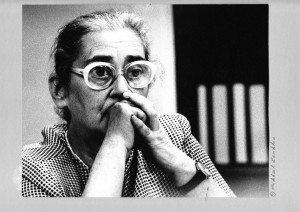Armenians this month mourn the loss of Elena Bonner, a great humanist and a leading combatant against the injustices of the Soviet era. She will forever remain relevant and inspirational to people worldwide, and to Armenians particularly, because of her forceful advocacy on behalf of the people of Karabagh.

Elena Bonner, the wife of Andrei Sakharov, the Soviet Union’s most prominent dissident scientist, and developer of Russia’s first hydrogen bomb, was co-founder of the Moscow Helsinki Group in the 1970’s. By relentlessly challenging state oppression, it quickly became the most active rights group in the entire movement. The organization’s mission was to publicize Soviet violations of the Helsinki Accord signed in 1975, recognizing Soviet hegemony in return for assurance of fundamental freedoms and human rights guarantees.
Throughout her lifetime, Bonner lent her voice to many causes. She spoke passionately on the human rights violations committed by Azerbaijan in Karabagh, and virtually from the onset of the national liberation movement there defended the right of the Armenian nation to self-determination. She did so from the highest platforms, calling international attention to the issue.
Among her public appearances was a lecture on “Nationalities in the Soviet Union: Possible Solutions within the Framework of a Revised Constitution,” which she made under the auspices of the Zoryan Institute and the Amnesty International Group of Harvard Law School in 1990. She reported that while the Soviet Army seemed incapable of halting violent pogroms by the Azeris against Armenians, Jews, and Russians living in Azerbaijan, troops had begun deporting Armenians from their native villages surrounding Karabagh
Bonner contributed a powerful foreword to The Sumgait Tragedy: Pogroms against Armenians in Soviet Azerbaijan, compiled and edited by Samvel Shahmuratian and published by the Zoryan Institute. The book contains the oral testimonies of 45 eyewitnesses and victims who tell what they saw and suffered during the infamous attacks against Armenians in February 1988. The book was published even as further pogroms were being committed in Azerbaijan. Those pogroms led to war between the Armenians of Karabagh and Armenia with Azerbaijan, which is still unresolved and remains an obstacle to peace in the region.
In her foreword, Bonner wrote: “Sumgait shook the Armenian people. It stunned with its brutality and with its cynicism… History will undoubtedly pass its verdict on the Sumgait genocide. But judgments of living history always come too late, bringing further misfortune… Beginning with the first mistakes made in Karabagh, the Sumgait events—which remain without official condemnation—brought an avalanche of tragedies down on our country [the Soviet Union], tragedies that will take long to fully comprehend.”
Being the eldest child of Bolshevik revolutionaries Gevork Alikhanyan, who once was a party chief in Armenia, and Ruth Bonner, Elena Bonner noted in her foreword: “Perhaps I, being half-Armenian and half-Jewish should not be the one to write this foreword. Perhaps it would be better written by the Azerbaijani woman who saved an Armenian family; this book contains her words: ‘Look what’s happening out there, my child is seeing all of this, tomorrow he’ll be doing the same things.’ This is a warning for all of us on this earth. If we do not find a way to make each state, be it large or small, a state for the people and not the other way around then our children and our grandchildren will become a brutal, unhuman mob.”
Being of Armenian and Jewish descent, it was natural for Bonner to refer to the Sumgait pogroms as genocide, in the same manner that the Armenians of Karabagh did. To everyone at the time, the events recalled vividly the atrocities committed during the Armenian Genocide, which was still within living memory.
Elena Bonner’s legacy continues to inspire countless people around the world as a commanding voice for human rights and remains a heroic figure for Karabagh Armenians.
The Zoryan Institute is the parent organization of the International Institute for Genocide and Human Rights Studies, which runs an annual, accredited university program on the subject and is co-publisher of Genocide Studies and Prevention: An International Journal in partnership with the International Association of Genocide Scholars (IAGS) and the University of Toronto Press. It is the first non-profit, international center devoted to the research and documentation of contemporary issues with a focus on genocide, diaspora, and Armenia.
For more information, contact the Zoryan Institute by emailing zoryan@zoryaninstitute.org or calling (416) 250-9807.


Thanks for the Article ArmenianWeekly.
Elena Bonner is truly a heroic, patriotic, fearless humanitarian Armenian woman: an inspiratin to us all, Armenians and non-Armenians alike.
It is interesting to observe, side-by-side, the level of interest in Mrs. Bonner vs. Mr. Baghdadlian on AW pages.
It is sad for someone to pass on before their time (Paul).
May both rest in peace.
A wonderful person who used her voice for good. She will be greatly missed.
Avery, I also noticed the difference in comments on the deaths of Paul and Bonner. There are many possible reasons for this and I won’t speculate except to say, the Armenian soul responds deeply to music….